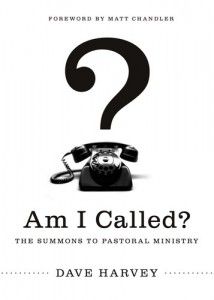
Dave Harvey can write a good book. And he’s got a new one out. It’s called Am I Called? The Summons to Pastoral Ministry (Crossway, 2012). Have a read of a free pdf of the foreword (from Matt Chandler) and opening chapter here. How about this for an appetite-wetter:
‘You see, God isn’t haphazard in whom he calls or what he calls a man to do. He doesn’t appoint bureaucrats over his church; he appoints men—flesh-and-blood, bone-headed mistake factories like you and me. He takes an ordinary guy, carves out his character, grants some grace, trains him with trials, zaps him with zeal, and corners him in his circumstances. Then you’ve got a pastor. That’s a story worth telling—a story about grace.’
This got me thinking about the language of ‘calling’. I’ve generally tended not to use the language of being ‘called’, apart from referring to the Christian’s calling to salvation. It seems this is really the only ‘call’ that we get clearly defined in the Scriptures that we’re to expect for ourselves: God’s sovereign, effective and gracious call to salvation, a la Jesus in John’s gospel: ‘You did not choose me, but I chose you and appointed you…’ (15:16), or Paul in Ephesians: ‘that you may know the hope to which he has called you’ (1:18). I wonder if at times all the chat about ‘calling’ and ‘vocation’ can cloud and distract from this wonderful calling that every Christian has and can rest upon. I’ve definitely witnessed up-close others believing the myth that the ‘minister’ or ‘priest’ is more spiritual than anyone else.
Certainly one sometimes hears the language of ‘calling’ being used by someone to give a super-spiritual gloss to what is potentially just a self-determined insistence on something, despite what everyone else is saying, i.e. ‘But seriously I’m called! This is so of God!’ From experience it can also make other people feel useless and less spiritual, leading to ‘how come I don’t feel God is calling me?’ or ‘why is that only vicars and pastors get called? Isn’t God interested in my life?’ I guess this relates to another post I wrote, discussing how we think & talk about how God guides us.

However as Harvey points out, it definitely is a weighty thing to aspire to be set aside for church leadership. The apostle Paul says as much to Timothy: ‘if anyone aspires to the offices of overseer, he desires a noble task‘ (1 Timothy 3:1). What follows on from that is a striking focus on the necessity of the godly character of such a person, as well as them being ‘able to teach’ (3:2), being able to look after their own family well, for this is effectively ‘mini-church’ (3:4-5), and proper relationships with unbelievers (3:7). Nothing about a feeling, how extrovert you are or how many books you’ve read. Boom.
In that sense I guess ‘calling’ helps to capture something of the weight of this role, i.e. it’s not something you simply walk into, or think about lightly. It’s something you want to discern wisely. Where it’s used sensitively, and as subordinate to every Christian’s calling to salvation, I don’t see what’s wrong with people talking about a ‘call to ministry’, i.e. a call to full-time set-aside gospel ministry, as long as people understand and explain that in biblical terms. How about ‘I’m thinking & praying through with others, having been encouraged to do so by church leaders I trust, regarding whether it might be most wise for the gospel, to use who I am and the gifts I’ve been given, to be set-aside and trained for the potential of a lifetime of being an elder/pastor in a church’.
A bit of a mouthful, I know! But I guess that’s something of how I’d describe where I’m at. On one hand I’d say, ‘Yes, given all factors, this is what it seems like God is leading me towards’. In that sense it is a spiritual experience, a ‘calling’ to test out, though so is every time we pray & think & talk & act upon what God’s revealed to us in the Bible. But on the other hand, it’s just sense. It’s not super-spiritual. It’s just what seems most sensible, under God, and in accordance with others, for me. We all want to be using all that we are – all of the time – for the glory of God through the furthering of the gospel and the building up of his people, and that will look like different things for different people.

For those interested Dave Harvey is responsible for church care, church planting, and international expansion for Sovereign Grace Ministries in the US, and has also written Rescuing Ambition (Crossway, 2010), and When Sinners Say “I Do”: Discovering the Power of the Gospel for Marriage (Shepherd, 2007), both of which are well recommended.
HT: Andy Naselli
What do you reckon?